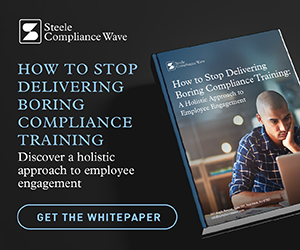10/3/16: Law firm Baker & McKenzie’s Global Compliance News provides a quick overview and link to the firm’s 2016 Global Overview of Anti-Bribery Laws Handbook. It’s one of the most useful guides to the status of anti-bribery laws and their enforcement in 47 countries. Each country has its own chapter, making the handbook easy to use, and each chapter includes such topics as facilitation payments, domestic bribery, risks associated with bribery and corruption.
Compliance Communications Blog
Compliance Wave
Recent Posts
10/3/16: In remarks prepared for the American Bar Association Southeastern White Collar Crime Institute, Principal Deputy Assistant Attorney General David Bitkower spoke about DOJ’s “… new, broad-based and proactive approaches to emerging issues in the area of white collar crime.” He focused specifically on those approaches in the areas of health care fraud, financial fraud, FCPA, and international. The remarks are worth reading, providing insight into DOJ’s thinking and approach to enforcing the multitude of laws under its jurisdiction. Among the topics that matter to compliance professionals: DOJ’s “metrics-oriented” approach to evaluating compliance for companies seeking to resolve criminal investigations, the FCPA, and global collaboration on investigations and prosecutions.
10/3/16: A post on the FCPA Blog by Gönenç Gürkaynak, Ç. Olgu Kama and Burcu Ergün from the ELIG law firm asks an interesting question. Why do people view violations of anti-corruption laws and anti-competition laws differently? The authors provide thoughtful ideas about why the two types of illegal behavior may be perceived differently. Those ideas touch on differences of consequence, criminality and drama. The short post on FCPA Blog gives a taste of the full article (requires purchase) through a link at the bottom of the post.
9/9/16: In the span of a week, two newsworthy actions happened related to the SEC’s whistleblower program. On August 16, the SEC announced a $340,000 settlement with a healthcare insurance provider that, according to SEC, illegally used “… severance agreements requiring outgoing employees to waive their ability to obtain monetary awards from the SEC’s whistleblower program.” That’s clearly a violation of every imaginable whistleblower protection measure and it’s illegal. Five days later, SEC announced that it had issued its first Whistleblower Program Award. Now, the two aren’t related but there is something beautifully ironic in the timing.
9/9/16: Antitrust guidelines might not be the most exciting topic, but intellectual property is definitely the most exciting – and valuable – asset of many companies. Recently, the US Department of Justice’s Antitrust Division and the Federal Trade Commission asked for public comment on a proposed update of the Antitrust Guidelines for the Licensing of Intellectual Property (also known as the IP Licensing Guidelines). The original guidelines, which established the agencies’ enforcement policies, were issued in 1995. It’s definitely time for an update to policies relating to the licensing of intellectual property protected by patent, copyright and trade secret law.


